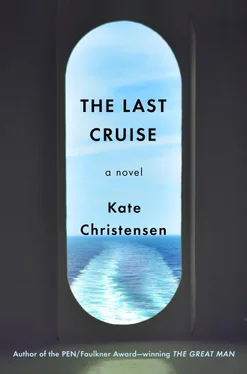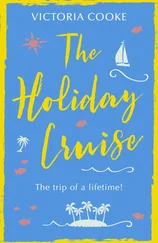“There you go,” said the waitress as she put Christine’s margarita down.
“I’ll be right back with your order, sir,” she said in Mick’s direction, walking off.
Christine could feel Mick watching her as she took a bite of her tacos. They were delicious, the grilled fish fresh and tender, the lime slices ripe and juicy, corn tortillas warm and soft. She gobbled it all down, taking periodic sips of her sweet, tangy drink, which she happily noticed was heavy on the tequila, and let her attention wander around the room, carefully not looking at Mick. At the bar, a girl who looked fifteen or so stood talking to a man on a barstool, leaning in close to him. She wore a leather jacket, and below that, apparently nothing. Her small, globelike butt cheeks glowed. When she bent slightly at the waist, Christine saw her bikini bottoms flash, but then the girl straightened and was once again half naked. The man she was talking to put an arm around her and pulled her into a half hug. He must be her father, Christine told herself, knowing she was wrong. More likely her roommate’s father.
She finished the tacos and downed the last gulp of sweet-tart melted ice in her drink, and sat back, panting gently. She was a bit tipsy, she realized, but whether this helped or worsened her sense of displaced alienation wasn’t clear. It was amazing that you could get on an airplane in Portland, Maine, before one o’clock in the afternoon, change planes in Chicago, and get off in California at just after five o’clock in the evening. She felt as if most of her psyche was still hanging somewhere over the Midwest.
When the short, dark waitress finally brought Mick’s burger and beer, Christine signaled for the check and absentmindedly ruffled the pages of her paperback while she waited.
Mick turned abruptly to her. Startled, she met his gaze. His dark eyes, unexpectedly sharp and intelligent, studied her, and for an instant she imagined she could see straight into his brute, embittered soul, and he could see back into hers, whatever it looked like. Probably bland and unremarkable to him, she thought, and she looked away, embarrassed, as the check came and she signed it to her room, and left the bar.
When she stepped outside, it was almost dark. She braced herself for the familiar bone-deep chill, tensing her arms close to her body and hunching her shoulders, but the air was still bathwater temperature, much warmer than the air-conditioned hotel had been, and her nose filled with the green, sweet smell of vegetation, a pleasurable shock after the sterile winter. She could feel her whole body relax into the unexpected relief of it. Strolling along the harbor path, she passed a few dawdling people, probably hotel guests like her, maybe fellow cruise-goers. She stopped to stare at the lights on the water. The harbor was a giant crescent around a calm and gleaming bay. Pelicans perched on the docks near moored sightseeing ships. Farther along, a ska band played an old Bob Marley song at a slightly slower-than-normal tempo, “Lively up yourself, and don’t be no drag.” The singer’s accent was Latino. Christine stopped to listen, found herself sitting in the cool grass watching a small group of toddlers spinning around to the music, jigging up and down, calling to their parents to watch them.
The sight of these small, exuberant people made her anxious. She and Ed had been married for seven years. He wanted children. She didn’t. There was no rational explanation for why she didn’t want them. It was just a feeling. But she knew it was hard for Ed to understand. She wished she could tell him exactly how she felt on those bleak winter days, when the world was muffled with frigid snow, and she would look around their small rough farmhouse, and out at the white-shrouded woods and rocky meadows, the frozen lake, the middle of nowhere. She pictured herself as a nineteenth-century farm wife, bearing children in pain and danger, nursing and tending and rocking and nurturing them one by one as they arrived, along with all the other daily and seasonal chores. That had been her great-grandmother’s life, even her grandmother’s. The silence and isolation. The endless hard work: cleaning, washing, chopping wood, canning. It was the same work Christine did now, but in those days she would have done it all by hand, without a vacuum cleaner or a chainsaw, heating water on a woodstove, without any regular contact with the outside world: no telephone, e-mail, Internet. The reality of marriage back then, the rock-bottom duty of it all, always made her shudder—half pleasantly, because it wasn’t actually her life. But it was close enough.
She resurfaced from her thoughts to discover that she was striding along the harbor path again. At some point she’d left the band behind, the dancing children, and now she was headed toward a grassy knoll, on top of which was a lighthouse. It could have been on the Maine coast.
Christine took off her shoes and sat, resting her chin on her bent knees, pressing her bare soles against the coarse sweet-smelling grass of the short hill, feeling a shivery pleasure in her solitude, a sense of possibility opening up before her as she gazed at the rosy water in the lowering light. Far out on what looked like islands was a gaggle of tall, spindly, insect-like oil rigs, gently bobbing as they pumped. Nearer in, the lights of the harbor glowed brighter as the sky got dark. Pelicans plummeted with open beaks toward the water. Even though they were rapacious predators, they looked appealingly clumsy and top-heavy. In the harbor, a freighter lay low in the water, stacked high with shipping containers, waiting to be unloaded by the cranes on the dock. She wondered what they were full of: maybe sneakers and cheap clothes from China or India, made by children in airless shacks. Or stuff made in shabby Third World factories, electronics or plastic toys or flimsy designer knockoffs of watches, bags, sunglasses. So much junk in the world, she thought: so much useless trash. Off to her right, in the next harbor over, hulked the grand, black-hulled Queen Mary, with her trio of raked funnels and black-on-red livery. Maybe the Queen Isabella was behind her, already in berth.
It struck Christine as completely absurd that she had just flown across the entire country and was about to get on a boat and sail to Hawaii. Back home, people went on cruises that left from Portland or Boston and sailed down the Atlantic coast to the Caribbean, or up to Nova Scotia and Prince Edward Island. Not that she’d ever been on a cruise before. She hated cruise ships. If Valerie hadn’t invited her and insisted through Christine’s repeated demurrals, Christine would never have agreed to do it.
But now that she was here, sitting in this seductive warmth, she was glad that she had. She felt the farm and Ed recede in her mind on a wave of tequila, along with her dog’s illness, the long and harsh winter she’d just endured, the spring planting cycle starting up anew, training the summer’s two apprentices. She knew all the hard work that waited for her as soon as she got home. She had been born into that work. She’d tried to escape it, had gone to journalism school, moved to New York and succeeded there, but Maine had called her back, in the end, as it did so many of its natives. Come back now, take care of me, it had called querulously, the opposite of a siren song, and she’d gone back, to marry a farmer, as Barnes women did.
Her phone buzzed. She took it out and looked at the screen. It was a text from Valerie. “Flight canceled. Taking the 6AM tomorrow. I’ll meet you at the ship, I guess? Hope you’re having fun!”
She wrote back, typing slowly with one thumb tip because she’d never learned to use two: “How horrible, so sorry. It’s great here. Call me when you land tomorrow.”
Читать дальше












